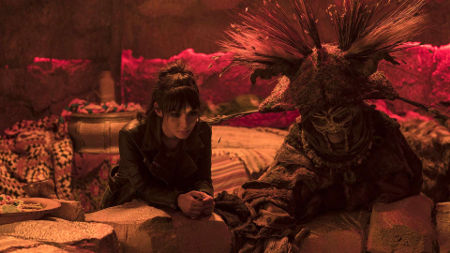DIRECTED BY: Julius Onah
FEATURING: Gugu Mbatha-Raw, David Oyelowo, Elizabeth Debicki, Chris O’Dowd, Daniel Brühl, John Ortiz, Aksel Hennie, Ziyi Zhang
PLOT: Scientists orbit the Earth attempting to use a particle accelerator to solve the world’s energy crisis, but accidentally open a portal to a parallel universe.

WHY IT WON’T MAKE THE LIST: When we first heard of The Cloverfield Paradox, it never occurred to us to consider it as a weird movie, given the straight sci-fi nature of the series’ two previous installments. But quotes like “might get a bit weird” and “it’s just sort of…..weird” from average-Joe reviewers out there put it on our radar screen. And by gum, they were right: it is “a bit” and “sort of” weird. But unfortunately, it’s not worth watching for fans of weird films, and will only appeal to the most dedicated remaining fans of the Cloverfield franchise, while driving many away from the series.
COMMENTS: I’m a fan of producer J.J. Abrams’ concept of making each movie set in the Cloverfield universe in a different style (I really want to see what they’ll do with the romantic comedy Cloverfield, I Love You), but the “confusing sci-fi B-movie with dodgy quantum science” genre was a bad choice for this third entry. The Cloverfield Paradox is so bad that it looks like a potential franchise-killer. Greenlighting this script is a hard-to-justify choice after the series just hit an unexpected peak with its second movie, the Twilight Zone-y thriller 10 Cloverfield Lane.
On The Cloverfield Paradox‘s parallel universe version of CNN, a talking head author warns of the dangers of mankind’s desperate space-based attempt to solve its debilitating energy crisis: “Every time they test [the particle accelerator] they risk tearing open the membrane of space-time, smashing together multiple dimensions, shattering reality…” As is always the case in bad B-movies, the wild-eyed guy with the off-the-wall jargon-laced theory he pulled out of his ass is (surprise) actually correct. Paradox‘s plot is bonkers, in a bad way. It adopts a mumbo-jumbo parallel universe theory in which anything can happen; there’s no rule book to follow, so the screenwriters are free to be as lazy as they want to, in pursuit of cheap special effects payoffs. In particular, one bizarre bit involving Chris O’Dowd’s arm beggars belief. I won’t spoil it (although other reviewers have detailed it to make a point about how absurd this movie’s plotting is) except to say that something similar could easily have fit into “Twin Peaks: The Return.” The problem, of course, is that Paradox is not “Twin Peaks” in space (which would be admittedly cool). “Twin Peaks” exists in a self-contained surreal universe where suspension of disbelief is not a relevant consideration. Paradox expects us to take its revelations seriously, as (perhaps crucial) canon in an extended universe.
Aside from its off-the-rails plot, the rest of the film isn’t much better. Despite having a couple of accomplished actors in the sprawling cast (O’Dowd and Debicki), the characters are given nothing very interesting to do. Gugu Mbatha-Raw, as a reluctant communications officer with a tragic past, does her best to generate some sympathy in a lost cause. The rest of the satellite crew make little impact, but the worst offender is the lone Chinese member, who is given minimal dialogue for one simple reason: she can’t speak English. How hard can it be to find a Chinese actress who speaks a little broken English, even phonetically? Can the other crew members actually see her subtitles when she speaks? Given the singular importance of this mission to all of mankind, why waste a precious slot on a crew member who can only communicate with her trilingual German boyfriend?
A minor quibble, perhaps, but a movie made up of nothing but a series of minor quibbles quickly grows old. Another example: the ship’s onboard gravity generator saves the filmmakers from having to deal with cool-looking but expensive zero-G realities, but is explained away with a hand-wave. A few cool moments, like the discovery of a woman in the walls and some independently moving eyeballs, can’t salvage the general feeling that the movie is punching way above its weight class, and getting pummeled in the process. Watch Paradox long enough, and you’re sure to say “I have no idea what’s going on.” A fine reaction for a David Lynch movie, but not the effect Julius Onah was going for.
Paradox was adapted from a script called The God Particle and retrofitted for the Cloverfield universe. Although a similar gamble paid off in 10 Cloverfield Lane, this outing suggests that a new strategy of producing films actually designed to fit into the series is warranted. The producers decided not to waste everyone’s time with a theatrical release, instead dumping Paradox onto Netflix as a surprise release after Super Bowl LII. A fourth Cloverfield movie is planned, but to succeed, it will need to find a way to overcome this Paradox.
WHAT THE CRITICS SAY:



